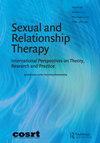姆巴里与尼哥底母叔叔:奈及利亚女大学生异性恋话语中的男性表征
IF 1.4
4区 心理学
Q3 PSYCHOLOGY, CLINICAL
引用次数: 1
摘要
摘要本文考察了尼日利亚女大学生异性恋话语中对男性的各种标签。来自实践共同体和性剧本理论的见解被用来证明使用情境语言选择来确定男性性行为的差异。该研究的数据是通过参与者观察和借助录音带录音和实地笔记的非结构化访谈产生的。该研究涉及22名女大学生的代表性样本,她们分别担任参与者和研究助理。研究结果表明,情境语言实践刺激了异性恋话语,女大学生创造性地给不同男性的性脚本贴上标签。这些标签包括男性的性表现、体型和性器官的大小、经济状况和婚姻状况、家庭和看门人的角色,以及男性在性阶段表现出的其他常规性行为,如求爱、性唤起和性交。这些剧本还结合在一起,重新演绎了女学生表现出新兴性取向的独特性叙事。人们相信,在大学社会背景下对这些男性的性行为进行分类,将为与全球其他年轻人社会群体的性行为进行比较提供一个基础。摘要:这篇论文讨论了尼日利亚一所大学的男性在与女大学生的异性恋关系中所表现出的各种性脚本。学生们根据性行为、经济状况和婚姻状况以及其他影响男性性生活方式的常规行为来给他们贴上标签。关键词:性标签异性恋话语女大学生男性性伴侣尼日利亚披露声明作者未报告潜在的利益冲突。上帝的礼物奥格班·乌文上帝的礼物奥格班·乌文是尼日利亚卡拉巴尔大学英语与文学研究系的高级讲师。他的研究兴趣包括:社会语言学、符号学和语用学,并为Scopus索引期刊撰写评论。他是著名学术和专业协会的成员,并在著名期刊上发表文章,包括《语言杂志》、《身份与教育》、《欧洲幽默研究杂志》、《国际语言教育杂志》、《语言问题》、《国际多语言研究杂志》、《语言学研究论坛》和《环境与社会心理学》等。本文章由计算机程序翻译,如有差异,请以英文原文为准。
Mbari and uncle Nicodemus: Male representations in the heterosexual discourse among female undergraduates in Nigeria
AbstractThis paper examines the various labels ascribed to males in the heterosexual discourse among female undergraduates in Nigeria. Insights from Community of Practice and Sexual Script Theory were used to demonstrate the use of situated linguistic choices to establish the differentials in male sexual behaviours. Data for the study were generated through participant observation and unstructured interviews with the aid of audiotape recordings and field notes. The study involves a representative sample of 22 female undergraduates who served as participants and research assistants. The findings reveal that situated language practices stimulate heterosexual discourses where female undergraduates creatively ascribe labels to the different males’ sexual scripts. The labels include those related to male sexual performance, body size and size of sex organs, financial and marital status, familial and gatekeeping roles, and other routine sexual behaviours shown by men in sexual phases such as advances, arousal and intercourse. The scripts are also combined to re-enact the peculiar sexual narratives by the female students that show emerging sexual orientations. It is believed that the categorisation of such males’ sexual behaviours in the University social contexts, would provide a basis for comparison with the sexual practices of other young adults’ social groups across the globe.LAY SUMMARYThe paper discusses the various strands of sexual scripts shown by men in their heterosexual relationships with female undergraduates in a Nigerian University. The students ascribed labels based on the sexual performance, economic and marital status, and other routine behaviours that have an impact on the male sexual lifestyle.Keywords: Sexual labelsheterosexual discoursefemale undergraduatesmale sexual partnersNigeria Disclosure statementNo potential conflict of interest was reported by the author.Additional informationNotes on contributorsGod’sgift Ogban UwenDr God’sgift Ogban Uwen is a Senior Lecturer at the Department of English and Literary Studies, University of Calabar, Nigeria. His research interest include: Sociolinguistics, Semiotics and Pragmatics, and he reviews for Scopus indexed journals. He is a member of revered academic and professional associations and has published in reputable journals including Journal of Language, Identity & Education, European Journal of Humour Research, International Journal of Language Education, Language Matters, International Journal of Multilingualism, Forum for Linguistics Studies, and Environment and Social Psychology, among others.
求助全文
通过发布文献求助,成功后即可免费获取论文全文。
去求助
来源期刊

Sexual and Relationship Therapy
PSYCHOLOGY, CLINICAL-
CiteScore
3.80
自引率
9.10%
发文量
37
期刊介绍:
Sexual and Relationship Therapy is a leading independent journal in its field, well established and internationally recognized. It offers an active, multidisciplinary forum for review and debate across the spectrum of sexual and relationship dysfunctions and therapies. The journal presents original research and best practice and is a vehicle for new theory, methodology, and application. Sexual and Relationship Therapy is edited by a respected international team and publishes contributions from around the world. It is the official journal of the British Association for Sexual and Relationship Therapy (BASRT).
 求助内容:
求助内容: 应助结果提醒方式:
应助结果提醒方式:


